Key takeaways:
- Last-minute changes in events often stem from unforeseen circumstances and highlight the importance of flexibility and adaptability.
- Effective communication and real-time updates among team members are crucial to managing chaos and maintaining event flow.
- Planning for potential disruptions, including establishing contingency plans, can help mitigate stress and turn challenges into unique opportunities.
- Collaboration and brainstorming can lead to innovative solutions and memorable experiences, transforming unexpected situations into positive outcomes.
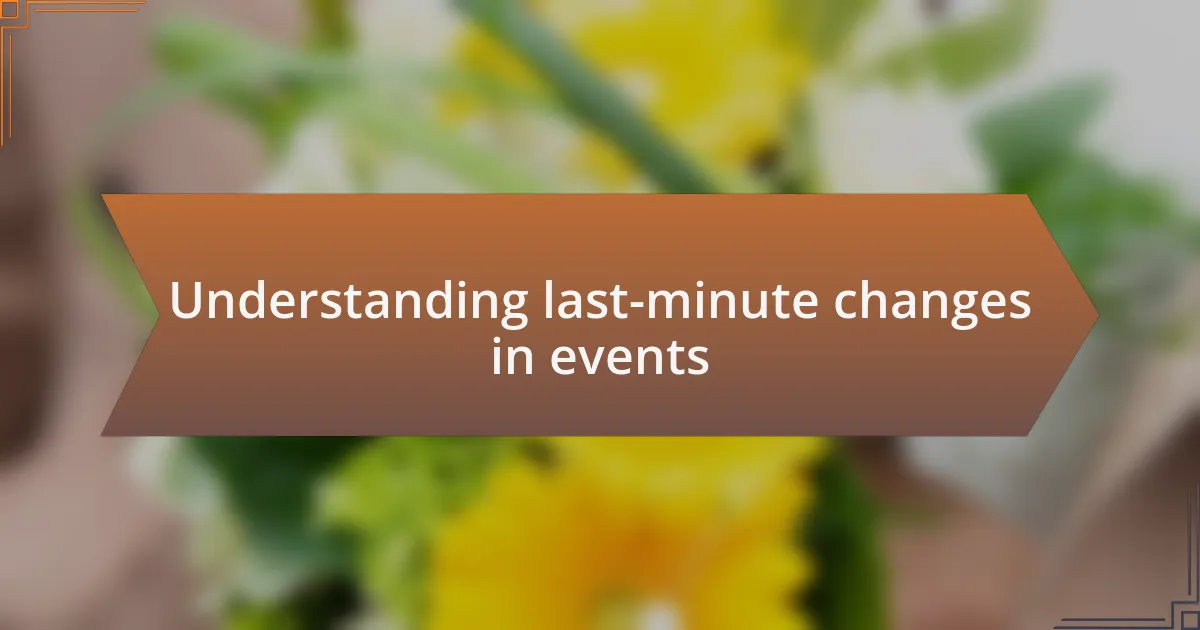
Understanding last-minute changes in events
Last-minute changes in events are often a result of unforeseen circumstances, like sudden weather shifts or unexpected guest cancellations. I remember a particularly stressful event where a vendor backed out just a day before; the panic was palpable, yet it forced me to think creatively. How do we adapt quickly when things go awry?
Emotions can run high during these moments, not just for organizers, but for attendees as well. I can recall a time when a key speaker couldn’t make it, and instead of letting the crowd down, I decided to host a spontaneous Q&A session with the audience. It turned out to be one of the most engaging parts of the event! What can this teach us about embracing the unexpected?
Understanding the root causes of these last-minute changes is crucial for any event manager. Often, it boils down to communication breakdowns or unexpected emergencies. In my experience, having contingency plans and a flexible mindset can turn a potentially chaotic situation into an opportunity for innovation. How do you plan for the unpredictable? The truth is, it’s not just about planning; it’s about being prepared to pivot when necessary.
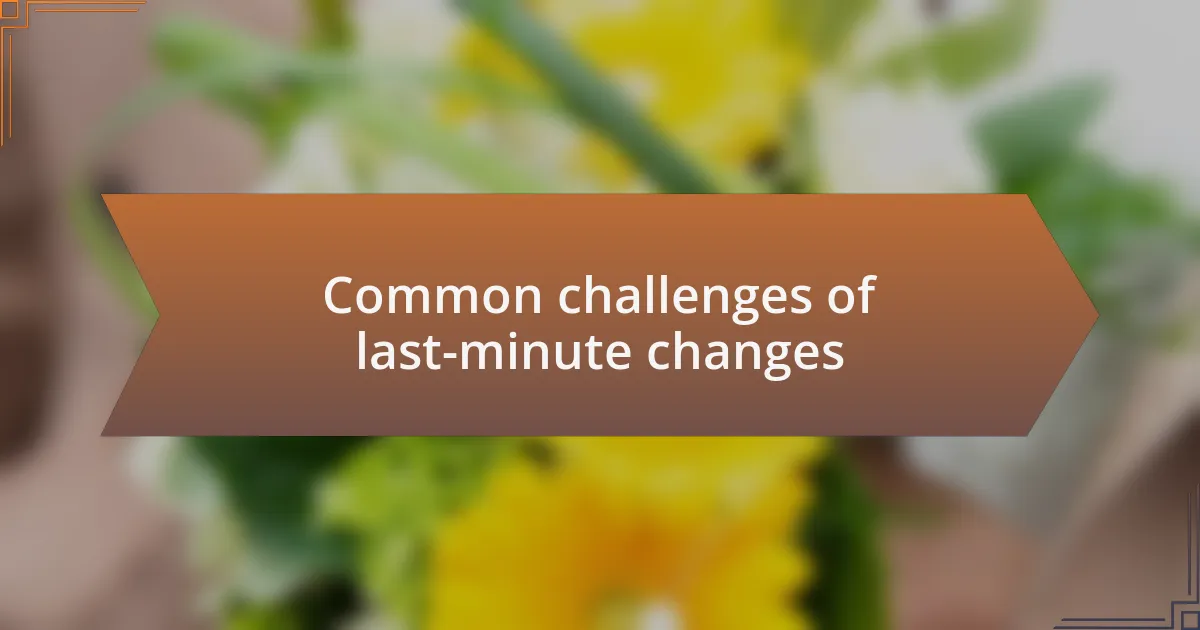
Common challenges of last-minute changes
One of the most common challenges I’ve faced with last-minute changes is the ripple effect they create on the entire event schedule. Picture this: a key performer cancels an hour before showtime. The sheer chaos that ensues can be overwhelming. I often find myself wrestling with the clock, trying to reposition acts or adjust timelines while keeping the audience’s energy up. How do you prioritize issues when everything feels urgent?
Another hurdle revolves around team communication. I’ve been in situations where last-minute changes weren’t effectively relayed to staff, which led to confusion during critical moments. One time, I had to rush to inform security about a venue layout change, only to find they weren’t briefed on the updated guest entry protocol. This taught me the vital importance of having real-time communication tools in place. What tools do you use to stay connected in high-stress situations?
Finally, managing expectations can be particularly tough. Attendees often come with set ideas of what an event will be like, so when surprises arise, it can lead to disappointment. I remember during an outdoor festival when rain forced us to move activities indoors. Initially, I was worried the vibe would falter, but it became a unique experience where people connected in smaller spaces. So, how can we transform potential disappointment into moments of connection? Embracing flexibility can turn challenges into opportunities, reshaping not just the event, but also the attendee experience.
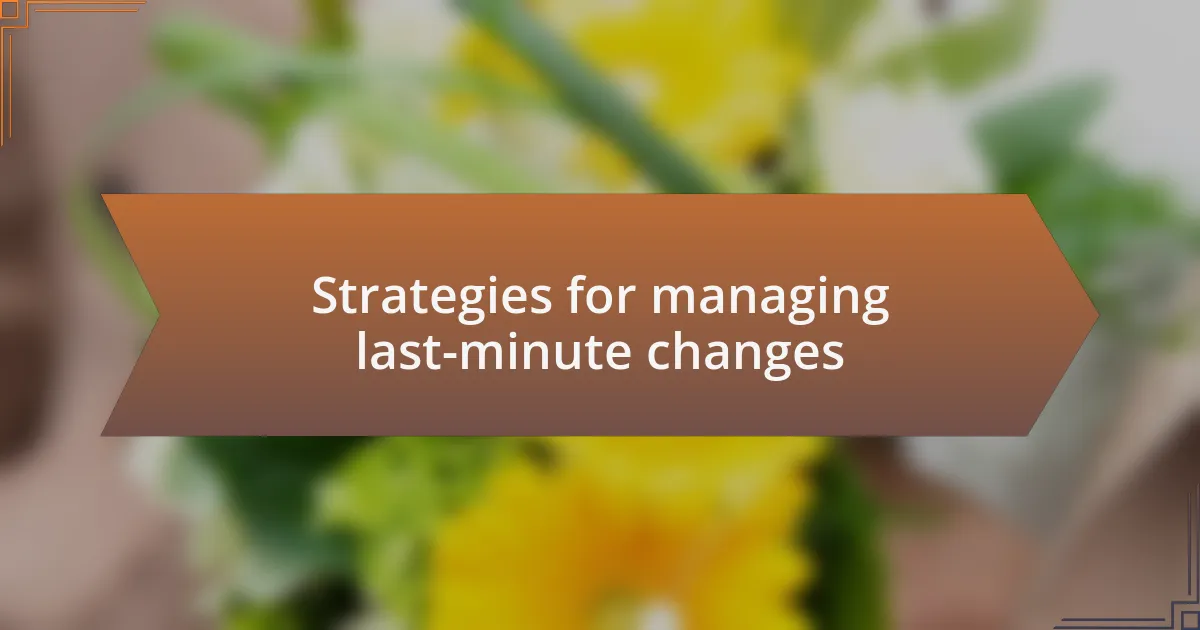
Strategies for managing last-minute changes
When it comes to managing last-minute changes, having a clear decision-making framework is essential. During one particular conference, I set up a rapid response team that included key members from different departments. When an unexpected speaker cancellation arose, we pooled our resources and quickly brainstormed alternatives. It was remarkable to see how rapidly we came together, but it also made me wonder: how can we prepare our teams to think on their feet reliably?
Another strategy that has proven invaluable is developing contingency plans ahead of time. I recall a charity gala where the venue’s power went out. Thankfully, I’d anticipated such a problem and arranged for a backup generator. It was a bit nerve-wracking to execute, but the backup allowed us to keep the event rolling seamlessly. How often do we think about potential hiccups ahead of time, and what can we do to internalize this habit?
Finally, surprises can indeed foster creativity. During a holiday event, a snowstorm forced us to shift our planned outdoor activities indoors. Instead of seeing it as a setback, I rallied the team to embrace it. We transformed the space with festive decorations, turning an obstacle into a cozy and unexpected celebration. How might embracing last-minute shifts enhance the overall experience for attendees? Adapting with enthusiasm often leads to experiences that attendees remember fondly for years to come.
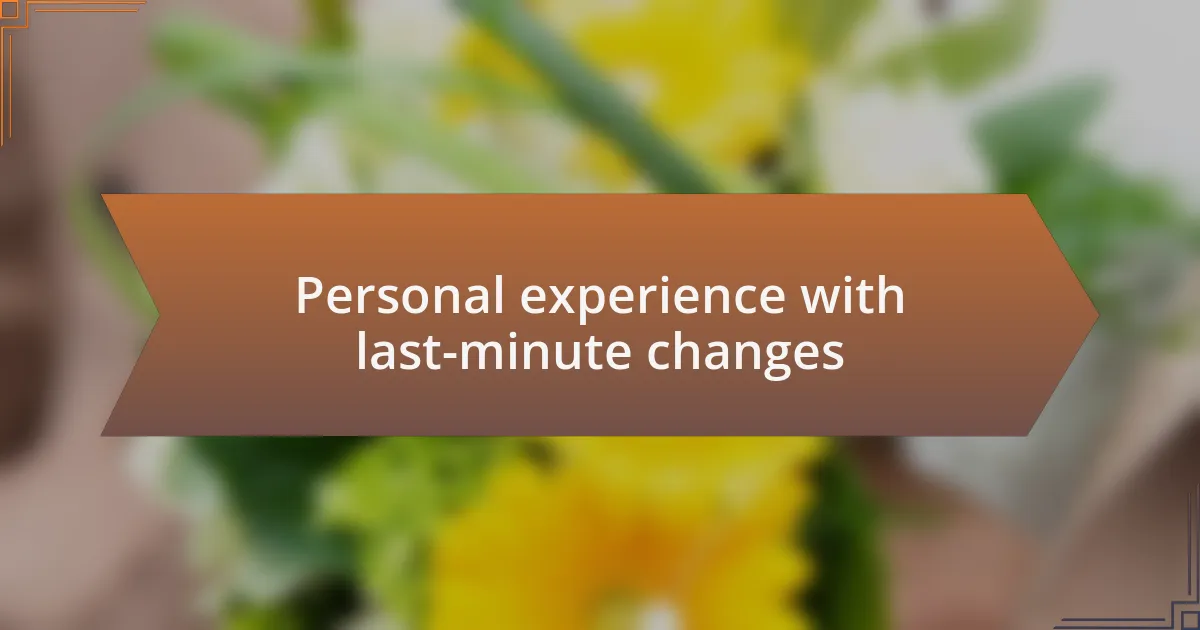
Personal experience with last-minute changes
I vividly remember the chaotic morning of a corporate event when our keynote speaker canceled less than 24 hours before showtime. As panic started to set in, I took a deep breath and gathered the team for an impromptu brainstorming session. It was amazing how quickly ideas flowed; we ended up bringing in a panel of experts from within the company, which turned out to be more engaging than the original plan. Have you ever had moments where an unexpected shift forced you to think creatively?
Once, I faced an unexpected venue change just days before a wedding reception due to unforeseen issues. I felt an intense rush of anxiety for a moment, but then I remembered the power of adaptability. We quickly contacted our preferred vendors and managed to secure a beautiful alternative venue. Witnessing the couple’s joy in the new setting renewed my appreciation for flexibility; it’s funny how the universe sometimes guides us to better outcomes. Doesn’t it make you wonder how much we underestimate our capabilities in high-pressure situations?
There was also a time when a last-minute decor theme change led to an unexpected stroke of brilliance for a festival. The initial plan was good, but when supplies didn’t arrive on schedule, it pushed my team to pivot and innovate. We introduced a spontaneous “retro” theme, complete with vintage decorations. The energy was infectious, and suddenly, we had something unique and memorable to offer attendees. Reflecting on this, I realized that sometimes life’s curveballs can lead us to ideas that we never considered before—how often do we let fear of change stop us from exploring new possibilities?
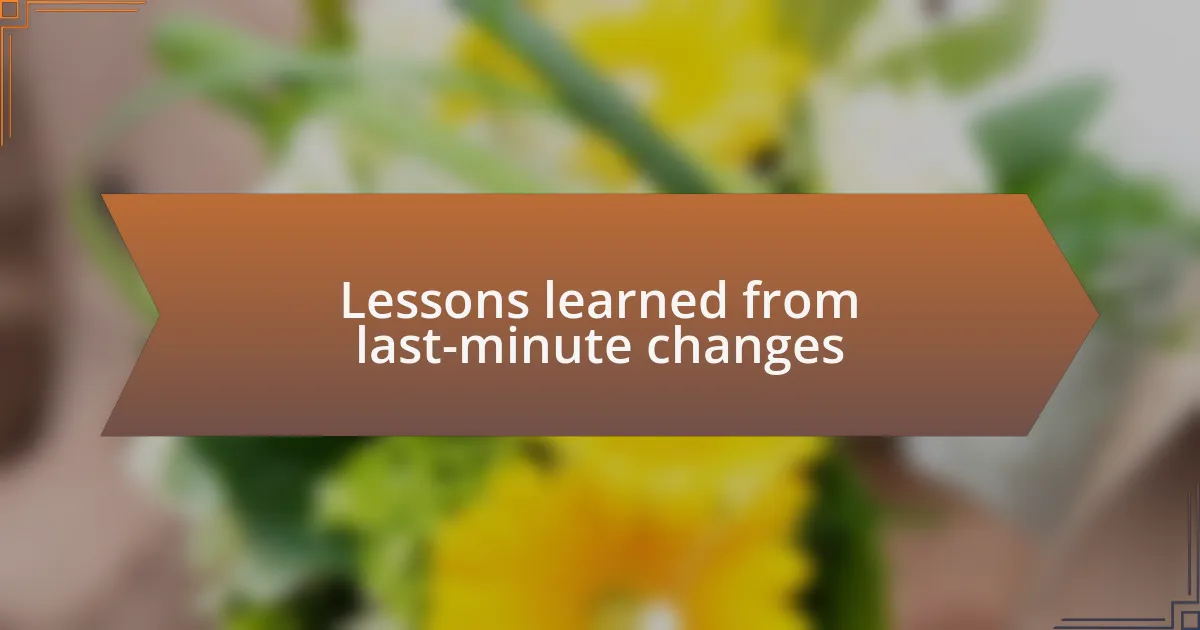
Lessons learned from last-minute changes
It’s fascinating how last-minute changes can turn into valuable learning experiences. I recall a time when we had to switch the schedule of a multi-day event, which left us scrambling to adjust our marketing materials just a day before launch. The mixed feelings of anxiety and adrenaline were palpable, yet it taught me the vital importance of being flexible. This experience reinforced the idea that maintaining an adaptable mindset is crucial, as it opens doors to solutions we might not have considered otherwise.
One standout lesson from these unforeseen adjustments is the significance of teamwork. During a last-minute agenda revision at an annual conference, our entire crew shifted gears seamlessly, showcasing our collective problem-solving skills. It felt empowering to witness how each voice added value in generating new ideas. Have you ever noticed how collaboration can transform stress into creativity? I’ve found that a supportive team environment not only eases pressure but also fosters a space for innovation.
Ultimately, I’ve learned that resilience is key when faced with unexpected changes. I remember when a weather-related delay almost derailed a summer outdoor event. While it was initially disheartening, I discovered the power of improvisation and quick thinking in those moments of crisis. Embracing these challenges has made me more resourceful and confident in navigating the unpredictable landscape of event management. How might we approach obstacles differently if we viewed them as opportunities for growth?